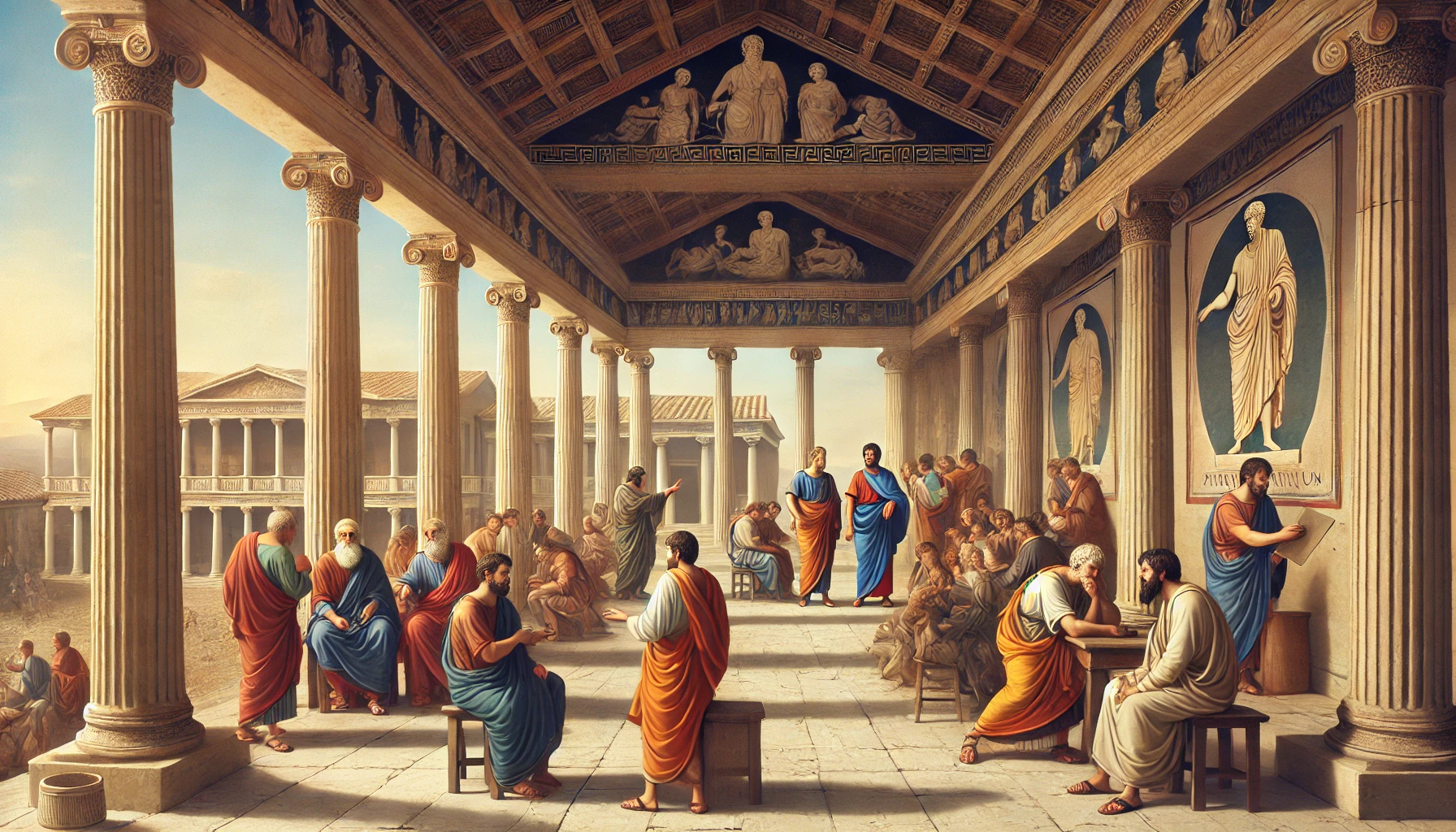Stoicism is a rich and complex philosophy that has profoundly influenced Western thought. Rooted in ancient Greece, it has traveled through centuries, offering timeless wisdom on how to live a virtuous and fulfilling life. This comprehensive guide explores the origin, key figures, and historical context of Stoicism.
What is the Origin of Stoicism?
Stoicism originated in the early 3rd century BCE in Athens, Greece. It was founded by Zeno of Citium, a philosopher who began teaching in the Stoa Poikile (Painted Porch), a colonnade decorated with murals. This location gave the philosophy its name—Stoicism, derived from “stoa.”
Zeno developed Stoicism after studying under various philosophers, including Crates the Cynic, who influenced his emphasis on virtue and simple living. Stoicism emerged as a response to the chaotic political and social environment of the time, offering a path to personal tranquility and ethical living.
Who Were the Stoics and What Did They Believe?
The Stoics were philosophers who followed the teachings of Zeno and expanded upon his ideas. They believed that the key to a good life lies in understanding and living in accordance with nature and reason. Central to Stoic philosophy are the concepts of:
- Virtue as the Highest Good: Virtue, comprising wisdom, courage, justice, and temperance, is the only true good. External factors like wealth and health are indifferent; what matters is how we respond to them.
- The Dichotomy of Control: Stoics distinguish between what is within our control (our actions, thoughts, and reactions) and what is not (external events). Peace comes from focusing on the former and accepting the latter.
- Living in Accordance with Nature: This involves understanding the natural order and our place within it, striving to live harmoniously with the universe’s rational structure.
Who Are the Most Famous Stoics?
Several figures have played significant roles in the development and dissemination of Stoicism:
- Zeno of Citium: The founder of Stoicism, Zeno taught that living virtuously in harmony with nature is the path to happiness.
- Chrysippus: A pivotal figure in Stoicism, Chrysippus expanded on Zeno’s teachings, systematizing Stoic logic and ethics. He is often considered the co-founder of Stoicism due to his significant contributions.
- Seneca the Younger: A Roman statesman and philosopher, Seneca’s writings, including “Letters to Lucilius,” offer practical advice on applying Stoic principles to daily life.
- Epictetus: Born a slave, Epictetus’ teachings, as recorded in “The Enchiridion” and “Discourses,” emphasize the importance of focusing on what is within our control.
- Marcus Aurelius: Roman Emperor and Stoic philosopher, his “Meditations” reflect his personal practice of Stoicism and provide profound insights into maintaining rationality and virtue amidst the challenges of ruling an empire.
Who Started Stoicism?
Stoicism was started by Zeno of Citium around 300 BCE. After surviving a shipwreck, Zeno found solace in philosophy and began studying in Athens. Dissatisfied with the existing schools of thought, he founded his own, teaching at the Stoa Poikile. Zeno’s philosophy quickly gained followers, laying the foundation for a school that would endure for centuries.
Who Was Against the Stoics?
Stoicism faced opposition from various quarters:
- Epicureans: Epicureans, who believed in seeking pleasure and avoiding pain as the path to a good life, often clashed with Stoic views on virtue and indifference to pleasure.
- Skeptics: Philosophical Skeptics questioned the possibility of certain knowledge, contrasting with the Stoic belief in rational understanding and the ability to attain true knowledge through reason.
- Cynics: While Stoicism was influenced by Cynicism, the latter’s extreme asceticism and rejection of societal norms sometimes conflicted with Stoic principles that allowed for a more balanced engagement with society.
- Roman Emperors and Officials: Certain Roman leaders, such as Nero, viewed Stoic philosophers as threats due to their emphasis on personal virtue and rational governance, leading to periods of persecution.
Conclusion
The history of Stoicism is a testament to the enduring appeal of its teachings on virtue, reason, and resilience. From its origins in the ancient stoa of Athens to its influence on modern thought, Stoicism offers timeless guidance on how to live a meaningful and harmonious life. Whether through the profound meditations of Marcus Aurelius or the practical advice of Epictetus and Seneca, Stoicism continues to inspire those seeking wisdom and tranquility in a complex world.
By understanding the origins, key figures, and opposition faced by Stoicism, we gain a deeper appreciation for this rich philosophical tradition and its relevance in our lives today.

